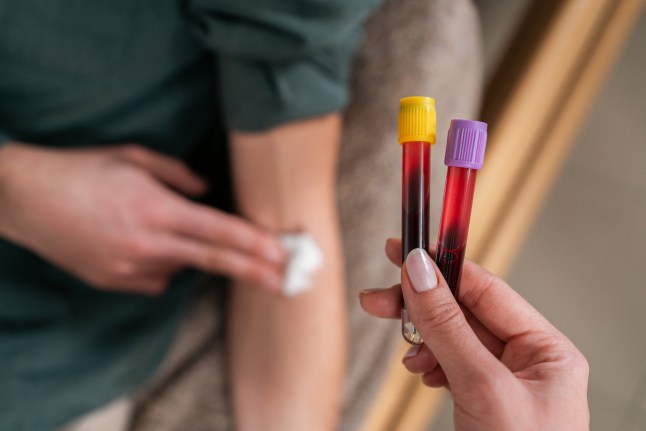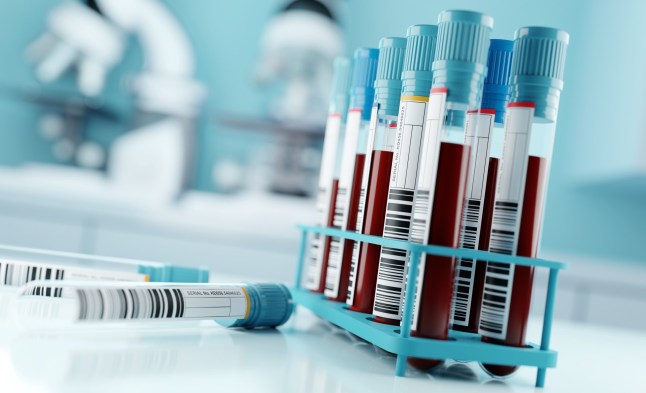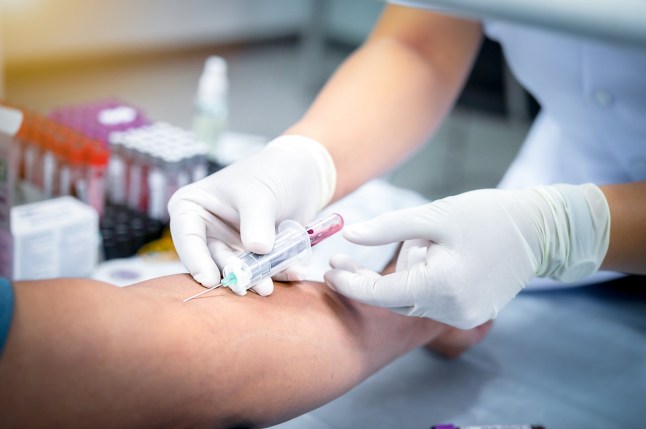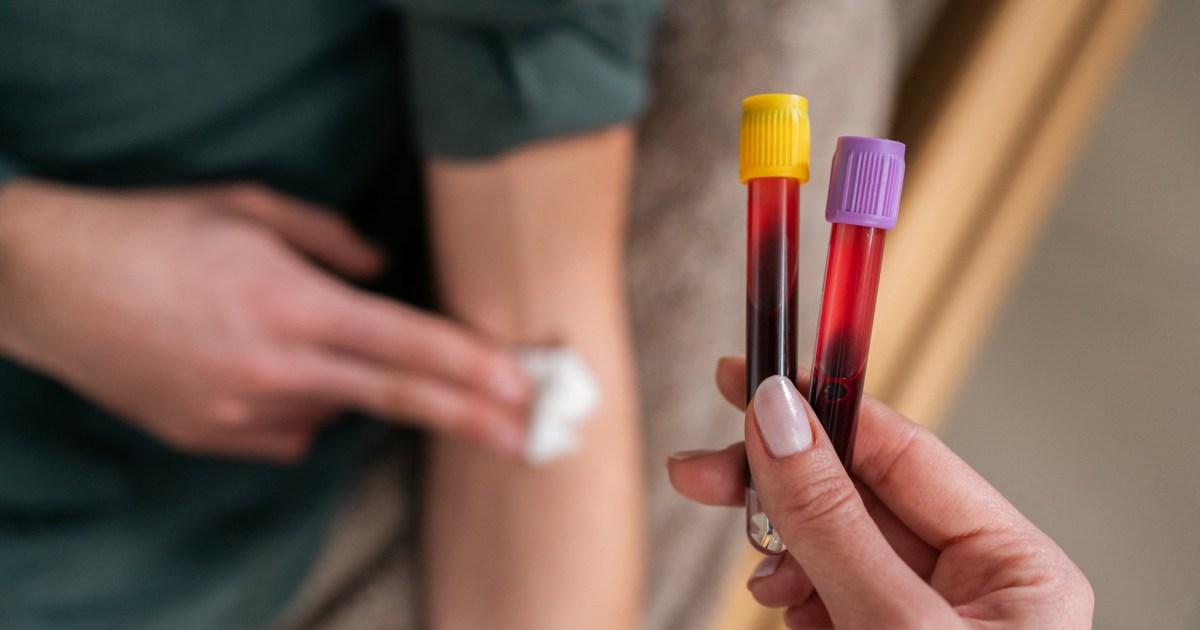
The Galleri test looks for the ‘fingerprint’ of dozens of deadly cancers (Picture: Getty Images)
A blood test that screens for more than 50 cancers is correct in nearly two thirds of cases where it thinks people may have the disease, a study has found.
The Galleri test, which can be given annually, looks for the ‘fingerprint’ of dozens of deadly cancers, often picking up signs before symptoms even appear.
It works by identifying DNA in the bloodstream that has been shed by cancer cells, giving the earliest signs somebody may have the disease.
Now, a key US trial on the test has shown that Galleri is highly accurate in ruling out cancer in people without the disease, while also picking up cancer cases at an early stage, when the disease is more treatable.
Of those people found to have a ‘cancer signal’ detected in their blood, 61.6% went on to be diagnosed with cancer, the findings of the Pathfinder 2 study showed.
Sign up for all of the latest stories
Start your day informed with Metro’s News Updates newsletter or get Breaking News alerts the moment it happens.
And in 92% of cases, the test could pinpoint in which organ or tissue the cancer arose, meaning time and money could be saved on other scans and other tests.
More than half (53.5%) of the new cancers detected by Galleri in the study were the earliest stage I or II, while more than two-thirds (69.3%) were detected at stages I-III.
Galleri, which has been dubbed the holy grail of cancer tests, also correctly ruled out cancer in 99.6% of people who did not have the disease.

The test works by identifying DNA in the bloodstream that has been shed by cancer cells, giving the earliest signs somebody may have the disease (Picture: Getty Images)
The findings are being presented at the European Society for Medical Oncology (ESMO) Congress in Berlin.
Sir Harpal Kumar, president of International Business and BioPharma at Grail, which pioneered Galleri, and former head of Cancer Research UK, said the findings were impressive.
He said: ‘We’re really very excited and we think this is a further step along the way in really transforming cancer outcomes.’
The Pathfinder 2 study looked at how the Galleri test may be used in a real-world setting, alongside regular screening programmes for things like breast and bowel cancer.
People from the US and Canada with no symptoms were recruited, of which 23,161 were analysed and had a follow-up period of at least 12 months.
The results suggested that adding Galleri to regular cancer screening led to a more than seven-fold increase in the number of cancers found within a year.
The test detected a cancer signal in 216 people, and cancer was diagnosed in 133 of these.
Therefore, the likelihood of receiving a cancer diagnosis following a positive test result showing a ‘cancer signal’ was 61.6%.
Sir Harpal said: ‘What we wanted to assess was, what added value does the test provide over and above existing screening?
‘And one of the most important and exciting results is the fact that it detected seven times as many cancers as the other screening programmes put together.’
He said the screening programmes in the US are slightly different to those in the UK but ‘in the sense of what screening programmes are offered, it’s comparable’.
An NHS Galleri trial on how well the test works in screening people without symptoms is expected to be published in the middle of next year.
Sir Harpal said: ‘Assuming we do get positive results from NHS Galleri, the opportunity to find substantially greater numbers of cancers before they present clinically means we should be able to find a lot more of them at an earlier stage.
‘This opens up the possibility we can use more effective treatments and, in many cases, curative treatments.
‘That should make a substantial difference to cancer outcomes.’
Sir Harpal said the fact the test can also pinpoint which organ or tissue the cancer is in makes the ‘diagnostic process very efficient and quick’.
Galleri can also aid doctors treating patients who may have vague symptoms.
Modelling suggests the Galleri test could be effective as an annual blood test in people from the age of 50, when cancer cases begin to rapidly increase.
Research published in the journal BMJ Open in May found that an annual blood test for cancer could lead to 49% fewer late-stage diagnoses and 21% fewer deaths within five years compared to patients receiving usual care.
Responding to the findings, Professor Clare Turnbull, from the Institute of Cancer Research, London, said data was needed on whether tests such as Galleri had an effect on reducing death rates from cancer.

Galleri has been dubbed the holy grail of cancer tests (Picture: Getty Images)
Professor Nitzan Rosenfeld, director of the Barts Cancer Institute in London, said the results were ‘impressive’ and the 62% figure was ‘very encouraging and provides strong evidence that this test could be safe and informative’.
He said more data was needed on mortality, but added: ‘Importantly, more than 50% of the cancers detected by the Galleri test in this study were early stage (stages I-II), and more than 75% of them do not have common screening options.’
Anna Schuh, professor of molecular diagnostics at the University of Oxford, said the likelihood that an individual with a positive test result actually has cancer is about 60%, according to the findings.
‘Or in other words: almost half of the time, the test gets it wrong when it calls a positive result,’ she said.
‘This is disappointing as it is only fractionally better compared to tossing a coin, although better compared to current screening tests where still most positive results turn out to be nothing.’
She suggested the current rate of detection may mean the NHS does not find it a cost-effective test.
She said the test sensitivity was good ‘for some of the common cancers (where it was 74%), but not so much for the others (that together make up more than half of all cancers) as for these the clinical sensitivity is poor (40%).’
Get in touch with our news team by emailing us at webnews@metro.co.uk.
For more stories like this, check our news page.
Arrow
MORE: Medieval skin disease leaving patients’ flesh ‘crawling’ surges through the UK
Arrow
MORE: As a single gay man, here’s how I take control of my sex life
Arrow
MORE: If you can do these 5 things in your 30s, your brain is in great shape
Comments
Add Metro as a Preferred Source on Google
Add as preferred source
News Updates
Stay on top of the headlines with daily email updates.

